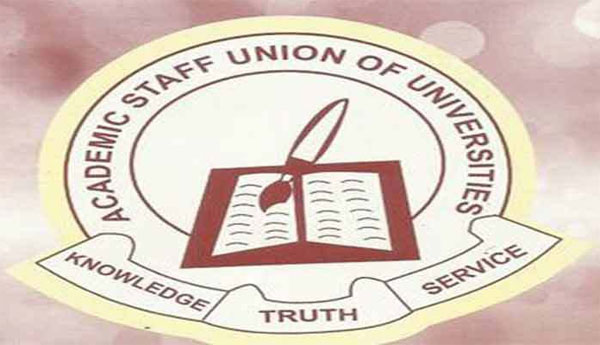
The leadership of the Academic Staff Union of Universities (ASUU) has raised the alarm that the two controversial tax reform bills before the National Assembly, if passed into law, will lead to the abolition of the Tertiary Education Trust Fund (TETFund) and, ultimately, destroy the tertiary education system in Nigeria.
ASUU President, Professor Emmanuel Osodeke, raised the concerns on Monday in Abuja, where the Executive Secretary of TETFund, Arc. Sonny Echono, announced a record-breaking N1.5 trillion in Education Tax collection for 2024.

Both Osodeke and Echono spoke at a one-day strategic engagement with heads of beneficiary institutions across the country.
Recall that President Bola Ahmed Tinubu had, on September 3, transmitted four tax reform bills to the National Assembly for consideration.
The reforms stemmed from the recommendations of the Presidential Committee on Fiscal and Tax Reforms, headed by Taiwo Oyedele, which called for a review of existing tax laws.
The bills are: the Nigeria Tax Bill 2024, which is expected to provide the fiscal framework for taxation in the country; the Tax Administration Bill, which will provide a clear and concise legal framework for all taxes in the country and reduce disputes; the Nigeria Revenue Service Establishment Bill, which will repeal the Federal Inland Revenue Service Act and establish the Nigeria Revenue Service; and the Joint Revenue Board Establishment Bill, which will create a tax tribunal and a tax ombudsman.
Osodeke, speaking on the bills, averred that two of them, which are targeted at TETFund, were intended not only to abolish the intervention agency but also to destroy the tertiary education system in the country.
He explained that the Executive branch of government is proposing that the tax paid by companies to develop education should be reduced from 4 percent to 2 percent, with the proceeds given to the Nigerian Education Loan Fund (NELFUND) to provide loans to students.
ALSO READ: Don’t disrupt 2025 Hajj preparations, CSO urges Reps committee
He warned that the proposed tax reform affecting TETFund could diminish the agency’s capacity to intervene in institutions and lead to its gradual winding down. He maintained that this would drastically impact funding for Nigerian universities, emphasizing the need to ensure these bills do not pass if the nation truly cares about its education system.
“I want to say that we have a lot of problems. If we don’t work hard, we will not be sitting here in the next six years. Nobody will be here in TETFund in the next six years,” he said.
“Whether we will be here or not in the next six years depends on the National Assembly. I am so happy the Senate and the House of Representatives are here. The information available to us as a union is that there are two sets of bills in the National Assembly. One is from the executive, and one is from the legislature, all concerning TETFund. The one from the executive takes a page. Out of 260 tax reviews, it is just a page in it. And I am very sure the president will not have the details to look at when he is reading.
“And what is there? That by 2025, they will increase the percentage of tax paid by industries to 4%. TETFund will receive 50% of it. By 2027, TETFund will be reduced to 3% from 4%, and it will receive 60%. But by 2030, TETFund’s percentage allocation will be reduced to 2%.
“It should not be given to a bank to lend out as loans. I look at this so-called NELFUND as a bank, and the money will now be given to a bank to lend to students. That bill is there.
“And all of us, if we still care about Nigerian universities, must make sure that this bill does not pass. But once it goes through, Nigerian universities will be affected. So when you hear our team talking, this is what we are talking about,” Osodeke said.
Speaking, the Executive Secretary of Tertiary Education Trust Fund, Arc. Sonny Echono, who promised a bumper harvest for universities and other tertiary institutions in 2025, said there was a remarkable increase in education tax collection by the Federal Inland Revenue Service in 2024.
He attributed the increase to the upward review of the Education Tax from 2.5% to 3%.
“The increase last year in the Education Tax from 2.5% to 3%, authorized by the Commander-in-Chief, President Bola Ahmed Tinubu, represents a significant stride for TETFund.
“This change, culminating with a record-breaking Education Tax collection of approximately 1.5 trillion Naira so far this year, reinforces the government’s dedication to strengthening Nigeria’s educational framework.
“This engagement is a testament to our shared commitment to establishing a harmonious working relationship with relevant stakeholders, fostering an environment where our efforts can be aligned to reposition TETFund for optimal performance.
“As heads of TETFund beneficiary institutions, you play a pivotal role in actualizing the mandate of the Fund. It is crucial that we engage constructively to set a clear course for the Fund’s direction and operational priorities.
“TETFund’s purpose is to empower our nation’s human capital, addressing the urgent need for capable, skilled professionals across all sectors.
“Established in response to the deficits in our tertiary education sector, TETFund began as the Education Tax Fund in 1993, transitioning in 2011 to its current form with a commitment to enhancing the quality of Nigeria’s public tertiary institutions through Education Tax contributions,” he stated.
Echono added, “We now enter the 2025 budget cycle with a stronger foundation, one that allows us to enhance our impact across the country’s tertiary institutions.”
He commended the Federal Inland Revenue Service (FIRS) for being a reliable partner from inception to date, noting their steadfastness and diligence in ensuring the timely and transparent collection of funding accrued from the Education Tax in the nation, aimed at propelling the tertiary institutions towards global recognition and excellence.
On his part, the Chairman of the Board of Trustees of TETFund, Aminu Bello Masari, lamented that the penchant of both the Federal and State governments for establishing new universities and other tertiary institutions without adequate financing is crippling education in the country.
He called for the removal of politics from the education sector, while urging universities to start devising means of creating their own funds, rather than depending solely on the government.
The former Speaker of the Federal House of Representatives and Ex-Executive Governor of Katsina State, while calling for sustainable funding of the sector, insisted that education must be prioritized, with politics taken out of its agenda.
Also speaking, the Chairman of Pro-Chancellors of Nigerian Universities, Ahmed Yayale, decried the poor funding of education in Nigeria, despite its relevance in achieving meaningful development for the nation.
He advocated for adequate remuneration of lecturers in tertiary institutions and other educators in the country, observing that the government should stop viewing lecturers’ salaries as mere personnel costs but as a dedicated budget item.








